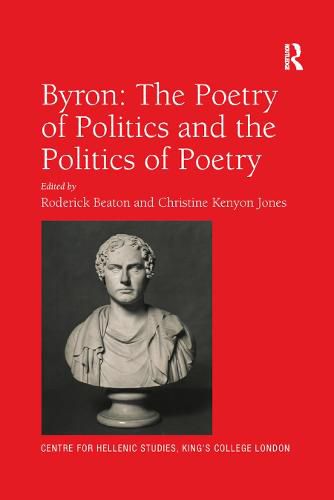Readings Newsletter
Become a Readings Member to make your shopping experience even easier.
Sign in or sign up for free!
You’re not far away from qualifying for FREE standard shipping within Australia
You’ve qualified for FREE standard shipping within Australia
The cart is loading…






‘It is no great matter, supposing that Italy could be liberated, who or what is sacrificed. It is a grand object - the very poetry of politics. Only think - a free Italy!!! Why, there has been nothing like it since the days of Augustus.’ So wrote Lord Byron in his journal, in February 1821, only days before the outbreak of revolution in Greece, where three years later he would die in the service of the revolutionary cause. For a poet whose life and work are interlaced with action of multiple sorts, surprisingly little attention has been devoted to Byron’s engagement with issues of politics. This volume brings together the work of eminent Byronists from seven European countries and the USA to re-assess the evidence. What did Byron mean by the ‘poetry of politics’? Was he, in any sense, a ‘political animal’? Can his final, fateful involvement in Greece be understood as the culmination of earlier, more deeply rooted quests? The first part of the book examines the implications of reading and writing as themselves political acts; the second interrogates the politics inherent or implied in Byron’s poems and plays; the third follows the trajectory of his political engagement (or non-engagement), from his abortive early career in the British House of Lords, via the Peninsular War in Spain to his involvement in revolutionary politics abroad.
$9.00 standard shipping within Australia
FREE standard shipping within Australia for orders over $100.00
Express & International shipping calculated at checkout
Stock availability can be subject to change without notice. We recommend calling the shop or contacting our online team to check availability of low stock items. Please see our Shopping Online page for more details.
‘It is no great matter, supposing that Italy could be liberated, who or what is sacrificed. It is a grand object - the very poetry of politics. Only think - a free Italy!!! Why, there has been nothing like it since the days of Augustus.’ So wrote Lord Byron in his journal, in February 1821, only days before the outbreak of revolution in Greece, where three years later he would die in the service of the revolutionary cause. For a poet whose life and work are interlaced with action of multiple sorts, surprisingly little attention has been devoted to Byron’s engagement with issues of politics. This volume brings together the work of eminent Byronists from seven European countries and the USA to re-assess the evidence. What did Byron mean by the ‘poetry of politics’? Was he, in any sense, a ‘political animal’? Can his final, fateful involvement in Greece be understood as the culmination of earlier, more deeply rooted quests? The first part of the book examines the implications of reading and writing as themselves political acts; the second interrogates the politics inherent or implied in Byron’s poems and plays; the third follows the trajectory of his political engagement (or non-engagement), from his abortive early career in the British House of Lords, via the Peninsular War in Spain to his involvement in revolutionary politics abroad.